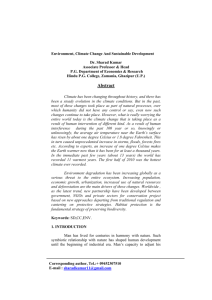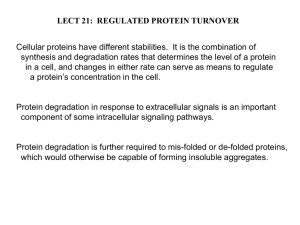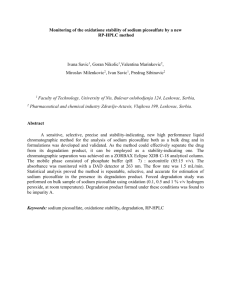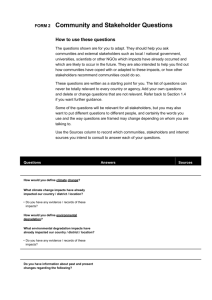611- Prospectus for Research Paper - 3-9
advertisement
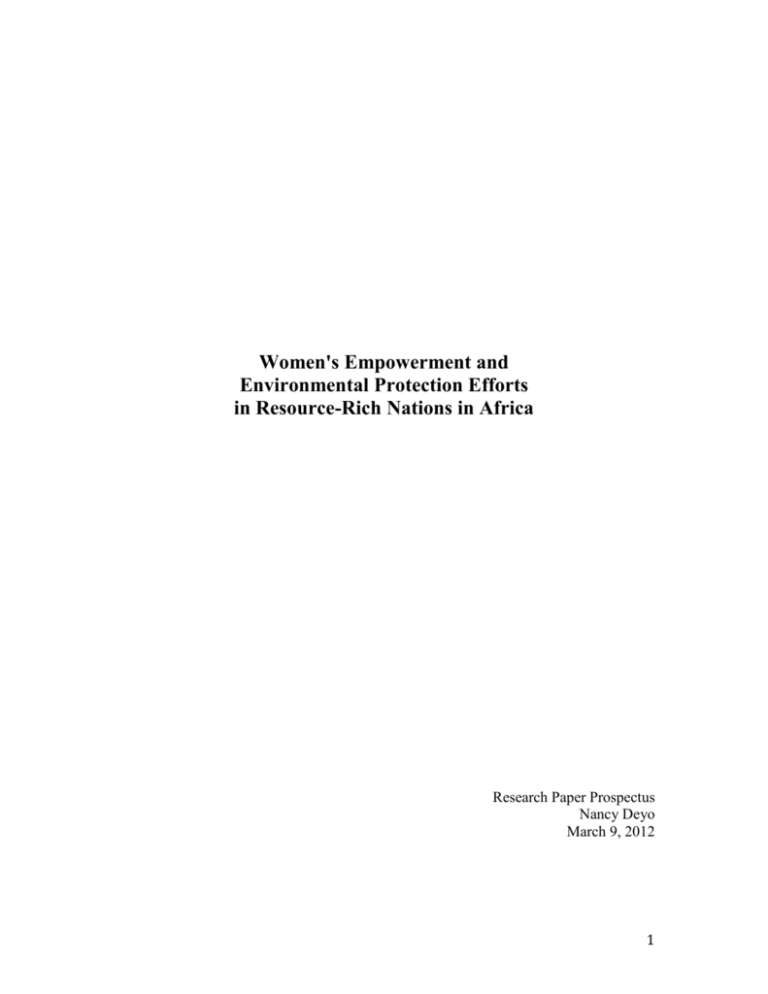
Women's Empowerment and Environmental Protection Efforts in Resource-Rich Nations in Africa Research Paper Prospectus Nancy Deyo March 9, 2012 1 My question of interest for the research paper is as follows: How do the outcomes differ when women are empowered versus excluded from participation in environmental protection efforts in resource-rich nations in Africa? This question has both academic relevance and practical significance for nongovernmental organizations (NGOs) and governmental bodies dealing with environmental protection and reversing the effects of environmental degradation. According to Clapp and Dauvergne (“Paths to a Green World,” 2011), “social greens” argue that global capitalism feeds environmental destruction, marginalizes women and imposes patriarchal domination. The way forward involves empowering women, promoting ecological justice and supporting local and indigenous knowledge. In terms of women's potential, women have created coalitions, associations and NGOs to tackle the everyday challenges of living in environmentally damaged regions. As such, women's capabilities and talents for intervention and development should be harnessed in order to address multinational corporations' (MNCs) environmental degradation situations (Anugwom & Anugwom, 2008). At a macro level, there is a strong correlation between nations with high levels of women's environmental NGOs and low levels of various forms of environmental degradation (Shandra, Shandra & London, 2008). Using case studies from several subSaharan African countries, evidence shows that increasing women's participation in communities is an effective strategy for environmental protection and sustainable development (Coleman, 2008). Further, according to Women's Earth Alliance – a women's environmental NGO working in 13 African nations – women’s unique position relative to families and their communities can make them key agents of change as they 2 adapt to environmental realities. In contrast, when women are excluded from key decision-making roles, it leads to environmental destruction, deterioration of health and increased levels of poverty. Therefore, answering this question and demonstrating the positive impact of women's empowerment on the environment has the potential to change women's roles in their communities, involve them at a regional/national level in environmental protection and policy-making, and reverse the effects of environmental degradation from deforestation, oil and other damaging extractive industries. This question relates to a number of critical questions and viewpoints in the areas of globalization, development and the environment. Most of the perspectives (Clapp and Dauvergne’s “Paths to a Green World,” 2011) are those of the social greens who argue that effective solutions to environmental problems will continue unless women's voices are integrated into the dialogue. They believe that the social injustice arising from globalization leads to inequality and industrialization and contributes to the eradication of women's rights. Further, social greens contend that society needs to focus on local solutions to help those most affected by global economic change – women. Importantly, social greens believe that women and indigenous people who would have been forced off of their land by global/state economic processes have rich local knowledge and practices that can help preserve the environment. This raises critical questions regarding the empowerment and education of women and the need to respect women's rights in the new global political economy. Finally, social greens call for measures to listen to the voices of marginalized women who hold critical environmental knowledge in the process of political and economic globalization. 3 The main argument of the research paper will contend that women's empowerment and involvement in decision-making has a direct, positive influence on environmental protection efforts and reduced degradation in the resource-rich nations of Africa. Evidence will include academic empirical research and NGO case studies where women have been empowered to participate in environmental protection versus research and examples where women have been excluded from participation. Specifically, academic empirical research will include: 1) a cross-national study of 61 nations which shows a strong correlation between women's NGOs and lower rates of deforestation (Shandra, Shandra & London, 2008); and 2) examples/case studies from several sub-Saharan African countries which show the potential benefits of increasing women's participation in communities as an effective strategy for environmental protection (Coleman, 2008). Case studies from Women's Earth Alliance will compare nations/regions where women are key agents of change in environmental issues with nations/regions where women's exclusion has led to environmental degradation. Further, an academic paper on women, oil and the environmental struggle in the Niger Delta region (Agunwom & Agunwom, 2008) shows that despite marginalization, women show incredible coping skills and resourcefulness. Examples of the work of women's associations include microcredit programs, social welfare, contribution to community development efforts, and loans for members in difficulty. Finally, Ikelegbe’s article on civil society (2005) finds that community women’s organizations are the most active and deeply committed in local oil economies through the construction of traditional women’s protests as an instrument of engagement. 4 There are a number of critical implications for these conclusions. First, active measures should be taken to increase women's participation in environmental decisionmaking. This could include involving women in positions of political authority, leveraging women's roles as teachers to disseminate environmental information, and making women integral participants in environmental policy reform. Second, efforts should be made to protect women's equal right to land ownership. As key caretakers of the land on which they work, rural indigenous women have techniques and knowledge that could help reverse environmental degradation in Africa. Other implications for consideration might include: 1) broadly recognizing women's potential role as environmental managers; 2) in patriarchal societies, reducing the gap between men and women by including women in MNCs/government discussions with the community on how to reduce damage to the environment; 3) targeting women as critical mediators and participants in peace-building efforts in volatile regions that have suffered from environmental violence and criminality (such as the Niger Delta); and 4) treating women as strategic agents of sustainable development. 5

